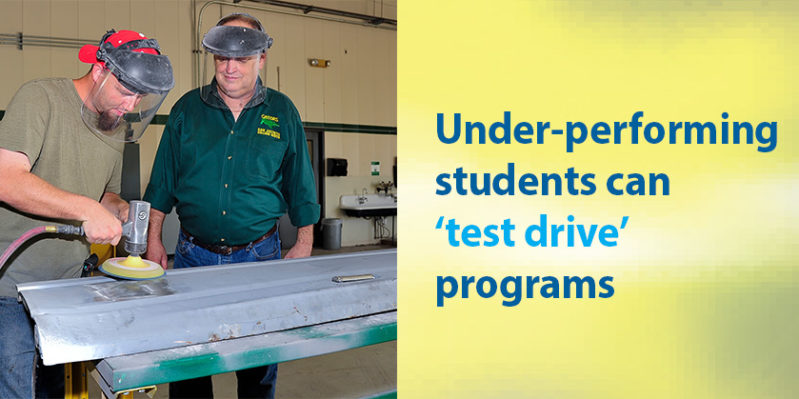
 Intentional Connections programs helps connect students with the right career path.
Intentional Connections programs helps connect students with the right career path.
The San Jacinto College Intentional Connections program provides guidance and mentoring to an underserved group of students – lower level college preparatory students who struggle with core subjects, but want to complete college and improve their lives.
Launched in 2011 with only a handful of students, the program gained traction rapidly. The enrollment at all three campuses for the Fall 2015 semester was 600.
“We offer Intentional Connections because under-performing developmental students often need extra assistance in order to adjust to college, stay in college, and complete certificates or degrees,” commented Dr. Rebecca Goosen, San Jacinto College associate vice chancellor for college preparatory.
Myrna Valdez, Intentional Connections coordinator, says most students at lower levels of college preparatory (developmental) classes have virtually no chance to succeed in college, often due to a lack motivation and support. She says that many of these students do not have a role model to follow, are often first generation college students, and are not aware of how to obtain financial aid or what questions to ask. “They need someone who can guide them to make the right decisions,” added Valdez. “They just need some helpful guidance, support, and encouragement.”
Trained faculty members serve as Intentional Connections mentors, or case managers, and work closely with identified developmental students, learning what career fields they may be interested in, and evaluating their educational strengths and weaknesses. After an assessment process, mentors help the students to get “connected” with key administrators and faculty members. “We let students ‘test drive’ different programs,” Valdez remarked. “For example, if a student says he or she is sort of interested in culinary arts, then we introduce the student to the culinary arts department chair, and the student gets to attend two or three culinary arts classes (not for credit) to see if it will be a good fit. If that does not work out, then the student can test drive another program.”

Intentional Connections allows students to “test drive” programs to ensure it is the right career path for them.
Photo credit: Rob Vanya, San Jacinto College.
One student who found new direction through Intentional Connections is Charles Powell. By his own admission, Powell does not do well in language arts. He does, however, enjoy building things and doing light mechanical repair work. During his assessment process, he said he would like to attend some auto collision repair classes. There was an instant connection, and Powell performed well in class, earning an occupational certificate in auto collision repair technology. After graduation, he found a good job in an auto body shop.
“Intentional Connections made a big difference,” Powell said. “My reading skills improved and overall performance in other areas improved. I finished college and found a career I really like.”
Intentional Connections case managers track the progress of developmental students until the students either earn college certificates or associate degrees, or until they transfer to higher institutions. Valdez says it is gratifying to help steer “at-risk” students in a positive direction. “I see how their attitudes change toward college once they meet with department chairs, visit classes, and learn first-hand from experts in the field,” she said.
Dr. Goosen says Intentional Connections provides a significant return on investment. “We are helping people who in the past frequently felt overlooked at school and are often marginalized to turn their lives around and become much more productive than they would be without college training,” she commented. “We don’t want to lose anyone, because everyone has value. Everyone can learn, given the right circumstances.”
– Rob Vanya
